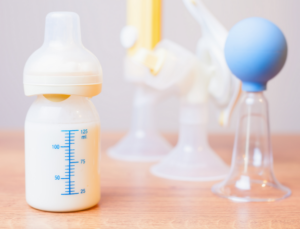
Insulin is one factor that has been identified as potentially relevant in breastfeeding because data suggest that it can stimulate maturation of the intestines. Nonetheless, the amount of insulin in breast milk has not been comprehensively studied, and so the specific links between insulin and milk and infant health have remained elusive.
A new study published in the Journal of Pediatric Gastroenterology and Nutrition has investigated the concentration of insulin in human milk as well as the time course of how that concentration changes. Specifically, the researchers looked at concentration of insulin in breast milk during the first 10 days after birth and also assessed the impact of maternal obesity, preterm delivery, and diurnal rhythm.
For their study, the scientists collected milk from 31 non-diabetic mothers, 21 of whom were pre-term (less than 37 weeks) and 10 of whom were at-term, 4 or more times each day for the first 5 days postpartum and once again on the 10th day postpartum.
The results showed that the insulin concentration in the breast milk rapidly declined by the 3rd day postpartum and then remained stable. The data also illustrated that the concentrations of insulin were generally higher in obese mothers than in non-obese mothers. Analysis of diurnal rhythms showed that insulin concentrations decreased through the night. Preterm delivery, however, did not influence insulin concentrations.
These new data help to clarify the content of human milk and how the content changes over time. More research will help to inform us about the implications of this content and the time course of the content so that physicians and women know how important human milk is for infants and how it compares to formula.
Reference
E M, L van T, AC H, CHP van den A, JB van G. Insulin Concentration in Human Milk in the First Ten Days Postpartum: Course and Associated Factors. Journal of pediatric gastroenterology and nutrition. Published online 2021. doi:10.1097/MPG.0000000000003214
